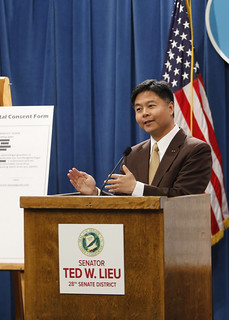Today, Chief Privacy Officer at Facebook Chris Kelly announced an exploratory committee for the race for California Attorney General. He joins a field that includes Assemblymembers Ted Lieu, Pedro Nava and Alberto Torrico; San Francisco DA Kamala Harris, and Los Angeles City Attorney Rocky Delgadillo. In his statement, which you can find at his website, Kelly talked about efficienct and effective government, Internet safety, proper training and equipment for law enforcement, and stopping trafficking. The words “prisons,” “jails,” “corrections” or “parole” was not mentioned.
Our prison system is a mess. We have the highest recidivism rate in the country, mostly because 2/3 of our prisoners returning to jail go there because of technical violations of their parole. This turns jails into giant holding pens instead of areas for rehabilitation and treatment, as well as colleges for nonviolent offenders on how to get involved in violent crime. The overstuffed prisons cost more money to staff and service as they become more dangerous, leading to the state spending more on incarceration than higher education. Despite all this spending, conditions in the prisons are medieval, with the ACLU proposing the closure of the LA County Men’s Central Jail. Prison officials are discussing release of 8,000 nonviolent and terminally ill offenders, but that’s a drop in the bucket. We also have denied prisoners their Constitutional right to health care, and have a federal receiver now remedying that situation, taking it out of the hands of the legislature. The “tough on crime” mantra that has ruled the thinking of both parties on this issue has utterly and completely failed.
And yet, our Attorney General candidates and our gubernatorial candidates view this absolute crisis as just another check on their list, instead of the serious problem it is. Gavin Newsom didn’t bring it up in his speech, though I did ask him about it in the blogger meeting afterwards. He talked about how we need a re-entry strategy better than the failed parole system, and cited some re-entry reforms in San Francisco that have helped matters. And he stated that having the courts step in to fix the problem presents an opportunity for real reform. With respect to the drug war, which lies at the heart of this, he expressed his support for drug courts and mental health courts and the kind of options that wouldn’t consign nonviolent offenders to the rigors of overcrowded prison life when they need medical treatment. And he vowed to have more detailed programs available soon. But when it counted, on stage, he said nothing. Jerry Brown did tackle the issue, but his non-stop fight against the prison health care receiver and sensible steps like Prop. 5 destroy any credibility he may have had on the issue.
I have appreciated Greg Lucas’ interviews with some of the candidates in the Attorney General’s race, and I have paid particular attention to their views on the prison crisis. (over)
Here are Alberto Torrico’s ideas to deal with recidivism:
CC: What’s the best way to reduce recidivism?
AT: First, we need to evaluate. See what programs work and don’t work. We’ve got to figure out what we’re going to do about these parolees. Put all these people out and then there’s too many parolees and too few parole officers. We can’t continue to pretend our prisons are drug rehab centers because they’re not. We need to get resources to people who can be helped and make sure when they’re tried at the local level they get put into programs that work.
I’ve been a criminal defense lawyer. I’ve been a labor lawyer. I represented a public agency. The judge tells people under Prop 36 (drug rehab law) that you’re not going to jail, you’re going to get counseling once a week for 12 weeks. You’re not going to beat an addition one hour a week over 12 weeks.
He seems earnest about lowering the recidivism rate as a financial and moral imperative, and these ideas are somewhat noble, but they read like bullet points, without the innovation necessary to really deal with this crisis. It’s not just about hoping the locals solve the problem, but a strategy that focuses on rehabilitation, re-entry and alternatives to prison right at the top.
Here’s Ted Lieu on the same subject:
CC: Not sure how much it costs but it has to be expensive when we parole 120,000 people a year and within two years over 70 percent are back in prison.
TL: It is a sort of downward spiraling problem. Because we have a prison-overcrowding situation we now aren’t doing any of the skills training in prison programs that teach people how to function in society when they leave prison. And then people come back to prison because they have nowhere to go and that increases the over-crowding.
I’m a big supporter of drug courts. If someone is addicted, they should get treated. When revenues are falling off a cliff its extremely difficult to fund the programs we need to help people when they get out of prison. Long-term view is that yes it costs some money now but in the long-term it would help the state save money.
If an inmate works toward a degree then they should get early release credits as an incentive to do such things. Part of the problem – and this is a much larger fix – is I think I we also need to improve our education system. If we did, we’d have less people in prison as well.
I just see a lot of people talking around the problem. I support drug courts as well, but I think there’s a mindset change that’s needed. The Attorney General at this point is in a position to transform the entire way we think about prisons and rehabilitation. Rocky Delgadillo gets closer to that.
CC: Speaking of costs, recidivism is very expensive. Something like 120,000 people are paroled each year and 70 percent are back behind bars within two years.
RD: We’ve got to get on the front end. One thing we know about gang members and people who have been in prison is they tend to have a shelf life it tends to end. But if they’re young and active and they go out they do it again. Why? Because in prison they get to hang out with the best in their business. And we pay for it. Great health care plan. So when they get out, they go back to it again. So the answer is to send less in.
We have a program called “First Chance.” I grew up in Northeast Los Angeles. People would say they’ll give you a second chance. You can’t have a second chance until you have a first chance. This is a program for young, but adults who get into our system. Not where they’ve done a serious crime but we know they’re involved with gangs or negative activity. We allow them to go to job training and school and if they complete it, we drop the charges. It’s a much better investment up front then to try and deal with them after they’ve been in prisons. In there, it’s an abyss.
Finally, here’s Kamala Harris, who actually pre-empts the discussion by raising recidivism without being asked:
CC: What role can the Attorney General play in the state’s seemingly endless budget mess?
KH: First, critically examine how the criminal justice system is working and whether we are being most efficient with limited dollars. Here’s an obvious example: Recidivism. California has the highest recidivism rate in the country. On an annual basis we release more than 120,000 prisoners and within two years of their release 71 percent recidivate. That’s costing us a lot of money.
In San Francisco, we created a re-entry initiative in my office. Its called “Back on Track.” It’s for low-level, first-time, non-violent offenders. I brought on my friends from labor – the building trades guys – friends from the business community, non-profits, and we give the parolees job skills development, education and help them meet things like parenting needs. A lot of these young offenders are parents. We reduced recidivism for this specific population from 54 percent to less than 10 percent. The national DA’s association has designated “Back on Track” as a national model.
My vote in this crowded Attorney General’s field will be almost entirely predicated on each candidate’s approach to the prison crisis. Will they reverse the “tough on crime” myth and start talking about sentencing reform? Will they discuss serious options to reform parole? Will they bring up innovative strategies around re-entry and recidivism that would put the focus on rehabilitation and spend on the front end to save on the back end (Hint: check with Kansas)? Will they touch the third rail of the failed drug war by moving toward decriminalization and keeping tabs on those who commit crimes with victims instead of nonviolent drug abuse?
I eagerly await the answers.
 Senator backs down from car tax discussion
Senator backs down from car tax discussion
